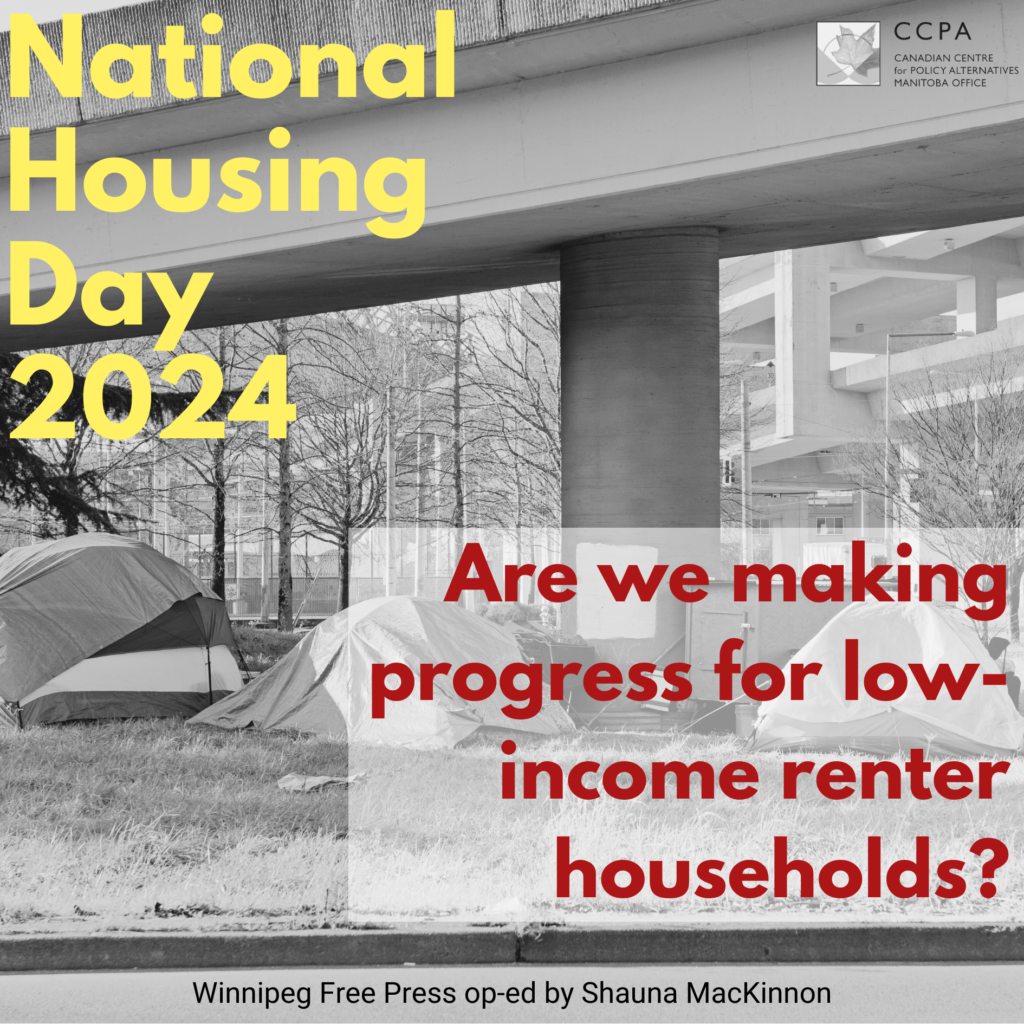
Published in the Winnipeg Free Press on November 22, 2024 and shared with permission.
November 22nd is National Housing Day in Canada. This provides an opportunity to reflect on our nation’s progress in response to Canada’s housing crises.
In 2017, Canada launched its 10-year National Housing Strategy (NHS): A place to call home. The strategy set out a long-term vision for housing with a focus on “improving housing outcomes for those in greatest need”. Central to the NHS and the National Housing Strategy Act (2019) is the recognition that “housing rights are human rights.” The Strategy aims to “progressively implement the right of every Canadian to access adequate housing.” It includes a variety of programs to expand Canada’s housing supply.
The problem is that they are not creating the housing that is needed the most.
While it is true that the federal government is investing more in housing than it has in decades, the emphasis is on incentivizing private for-profit developers which is mostly creating housing that is not affordable for low-income households. Public investment in the development and maintenance of social housing supply has been shown to be more cost-effective in the long-term, and essential to ensuring adequate rental housing is accessible to low-income households in tight, poorly regulated and discriminatory rental markets. Advocates for these renter households maintain that there needs to be a shift in priority toward non-market housing development including both public and non-profit owned if we are to achieve the baseline goal of 500,000 additional deeply affordable units nationally and 10,000 in Manitoba in 10 years.
Affordable rental housing in Winnipeg
The 2021 census shows that 28.9% of all renter households in Winnipeg pay more than 30% of income on rent. Between 2011 and 2021, Winnipeg saw a decline in private rental units affordable to households earning less than $40,000 a year. The 2024 CMHC rental market report shows that even though the rental market universe expanded in 2023, affordable rentals remained scarce. A one-bedroom apartment in Winnipeg rents on average at $1100, which is unaffordable to minimum-wage earners and individuals reliant on government income assistance. This raises an important question—what type of rental housing is being built through the NHS and other CMHC programs that are supposed to ensure Canada is improving housing outcomes for persons in greatest need?
The NHS reports quarterly on the progress of its four main capital programs: the Apartment Construction Loan Program (ACLP), the Affordable Housing Fund (AHF), the Rapid Housing Initiative (RHI), and the Affordable Housing Innovation Fund (AHIF). Only the Rapid Housing Initiative requires units to rent at rent-geared-to-income (RGI) rates affordable to low-income renters. The data shows that between 2018 and March 2024, NHS expenditures in Manitoba from these programs was $407.5 million, of which $370.5 was spent in Winnipeg. This resulted in the development of 2,145 units in Winnipeg with 90% funded through programs that don’t require RGI units.
Although 1,681 (78%) of NHS supported units in Winnipeg are considered “affordable”, based on various program criteria, their rents are only affordable to middle and high income households. Only 253 of these “affordable” units (representing 15% of all units) are affordable to the lowest-income households. This is far less than the 1,000 units the Right to Housing Coalition has determined is needed in Manitoba per year (750 in Winnipeg) and less than 2.5% of what is needed over 10 years.
The most recent federal program that isn’t part of the NHS but aligns with it, is the Housing Accelerator Fund (HAF). In 2023 Winnipeg signed a $122 million agreement with the Government of Canada which includes funding for a capital grant incentive program administered by the City of Winnipeg. HAF incentivizes developers to expand the supply of housing. The City of Winnipeg recently announced HAF funding for 1135 units, 231 of which are subsidized at RGI rates. Some of these projects also received NHS funding and are already captured in the 253 RGI units Winnipeg gained through the NHS. With political will, future rounds of HAF funding can lead to more significant increases in the supply of RGI housing. However, federal Conservative leader Pierre Pollievre recently announced that he will eliminate the HAF if elected. This willis worrisome because it will impede the development of sustainable rental housing for low-income households.
What does this tell us about Canada’s commitment to housing for those in greatest need?
The government of Canada and its housing agency CMHC whose goal is to “ensure that everyone in Canada has a place to call home” have developed a suite of programs to stimulate the development of purpose-built rental housing. It is clear that it is not creating the housing that is needed most.
If Canada is to tackle the housing crisis where it is most severe it will need to use all the tools at its disposal, including the redirection of NHS investments toward the expansion and maintenance of non-market social housing that rents at less than 30% of household income.
Shauna MacKinnon is a professor in Urban and Inner-City Studies at the University of Winnipeg and a member of the Right to Housing and the Social Housing and Human Rights Coalitions.


